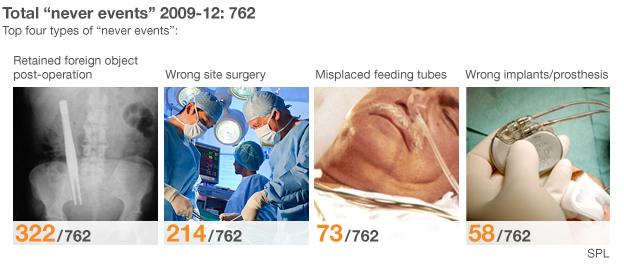Hospitals reveal 750 'should never happen' blunders
- Published

More than 750 patients have suffered after preventable mistakes in England's hospitals over the past four years, a BBC investigation has found.
The incidents, such as operating on the wrong body part or leaving instruments inside patients, are categorised by the Department of Health as "never events".
This means they are incidents that are so serious they should never happen.
NHS England admitted the figures were too high and said it had introduced new measures to ensure patient safety.
The department has categorised 25 incidents that should never happen if national safety recommendations are followed by medical staff. The BBC discovered through Freedom of Information requests to NHS trusts that the majority of mistakes fell into four categories.
There were 322 cases of foreign objects left inside patients during operations; 214 cases of surgery on the wrong body part; 73 cases of tubes, which are used for feeding patients or for medication, being inserted into patients' lungs; and 58 cases of wrong implants or prostheses being fitted.
Frances, whose name has been changed to protect her identity, was admitted to hospital last year for a hysterectomy. After her operation, surgeons realised that a swab was missing and had been left inside her.
They immediately carried out a second operation to remove it, but during this procedure a drain was left in her abdomen. A few weeks later, she was taken back into hospital as she was seriously ill and in severe pain.
A routine gall bladder operation left Donna Bowett suffering constant abdominal pain after surgeons left a seven-inch pair of forceps inside her body
Frances underwent emergency surgery to remove the drain, which had caused a large, pus-filled abscess to develop. She has now been left with a colostomy and faces further surgery.
"My initial reaction was 'no'. They can't do it twice," she said.
"They did an internal inquiry and the consultant who was leading the internal inquiry said on a couple of occasions he couldn't understand how this has happened, because the procedures for this sort of thing were written in stone.
"Thinking about it philosophically, better the colostomy than a coffin. I had one foot in a coffin so it's the better option. I'd rather be here than up the crematorium with a wreath on me."
Ian Cohen, a medical negligence solicitor and head of medical negligence at Goodmans Law, based in Liverpool, said the whole system of reporting "never events" was flawed.
"I think the figures are shocking," he said. "They really are the tip of the iceberg.
"There is an emphasis on the 'never event', but actually there is a bigger picture: missing the fact that we have hundred of thousands of adverse incidents, never mind just 25 particular categories. And the danger is that it takes the focus away from a much wider problem."
He argued that hospitals have no incentive to report "never events" because they may have to reimburse the cost of the procedure to the NHS as well as paying for the patients' long-term care.
Margaret's mother died after a feeding tube was inserted into her lungs
"If that's the case, surely that does not encourage openness if there are already problems with the budget in the NHS," he said.
Horrific as these incidents are, it is important to put them in context. On average each year there are 4.6 million hospital admissions to the NHS in England that require surgery. The NHS says the risk of a "never event" happening to you is one in 20,000.
Dr Mike Durkin, director of patient safety for NHS England, said the 700 "never events" were "too many". He said: "One is too many in any week, in any day, in any hospital."
He added that NHS England had started collating the data to help educate staff on better practice.
"We need to understand what it is, in some systems and in some hospitals, that that team working hasn't produced an effective outcome and a mistake, and a 'never event' has occurred," Dr Durkin said.
"This is not just the concern of one operating theatre in one hospital. It should be the concern of the leadership of that organisation, of the trust, so that they lead that trust and support both the staff in the operating theatres to work effectively, but also recognise their responsibility for leading safety across the whole of the trust."
The World Health Organisation's patient safety checklist, external has also been adapted for use in England and Wales.
However, when the patient safety rules are not followed, the results can be catastrophic, as Margaret, whose name has also been changed for reasons of privacy, found.
Guilt
Her mother was admitted to hospital after a stroke. But medical staff put a feeding tube into her lungs rather than her stomach. Nutritional fluids went into her lungs, she contracted pneumonia and died.
NHS director Mike Durkin: My reaction is one of disbelief
"You feel guilty because when she [was] talking to us she kept saying she wanted to come out, and we kept saying, 'You can't come out, mum, until you get better," Margaret said.
"You feel angry after, because you think someone's killed your mum. No, they probably didn't do it on purpose but that's how it feels. You feel that somebody's killed her."
Margaret is still awaiting a date for an inquest. She thinks staff failed to follow basic procedure by omitting to give her mother an X-ray to check the tube's location. NHS guidance says that, if in doubt, this should be done as a secondary test.
- Published8 October 2010
- Published25 March 2013
- Published28 November 2012
- Published28 February 2012